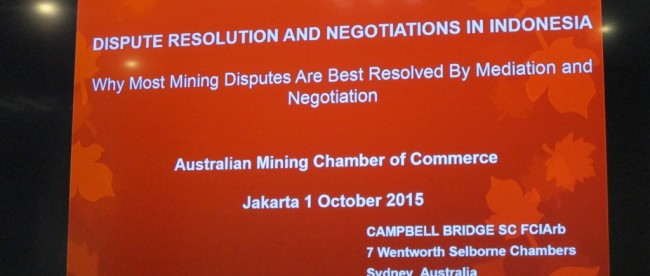Campbell Bridge recently conducted a short interactive seminar at the AUSMINCAHM offices in South Jakarta [ www.ausmincham.com ,secretariat@ausmincham.com ]. Campbell [ www.campbellbridge.com ] has conducted more than 600 mediations in Indonesia, Australia and may other places, and has a strong affinity for the Indonesian culture. The talk emphasized disputes between foreign (typically the aggrieved party) and Indonesian parties. Some points that I found which complimented and build upon my Indonesian experience included;
- Don’t go to court if you can avoid it. The Indonesian court system, including BANI, is often influenced by the protocols of the lawyers, wherein their fee structure and other influences may not encourage a quick resolution. Having an overseas court decision imposed in Indonesia can be difficult and best works where the Indonesian party has off shore assets that can be levered upon. Having Indonesian court decisions implemented can be a separate and time consuming/non-event.
- Court action is typically open to the public & press, that the parties may not want, whereas mediation is private and is typically confidential.
- Mediation is a preferred avenue path to dispute resolution, wherein it is more certain that any mediation will be implemented.
- Many disputes arise, or are exacerbated by, cultural misunderstandings, wherein the mediation process often can be made smoother by one party, or the other acknowledging such cultural mistakes.
- Attempting to apply pressure is typically bias against the foreign party. Foreigners attempting to resolve disputes through increasing the conflict tempo (expanding the “fault” through fine print in contract) will only cause the Indonesian party to dig in their heels. Whereas Indonesians applying strong hand tactics (threaten police / immigration action) have little to be countered by the foreign party.
- Taking note and applying Indonesian good social ethics / culture appreciation is an extremely strong factor to resolve conflicts.
- Contracts typically should include clauses on dispute resolution, starting with mediation etc. Once mediation is completed, then some form of documentation is good, but not always suitable.
- There are some avenues for foreign parties to exploit to help their case, including;
- Use of good mediation, which may be able to find solutions that neither party previously considered.
- Apply suitable social etiquette at all stages of the process, particularly to managing meetings – who is present, who talks, and face to face etc.
- Getting the support of an Indonesian party of influence, such as an uncle or respected business / community leader.
- Remind the parties this process is unpleasant, and distracts from further business activities.
- The potential embarrassment of the Indonesian parties through inviting influential parties to participate.
- To be persistent and pleasant, to reignite earlier good relations between the parties, to improve their resolve to resolve the dispute.

